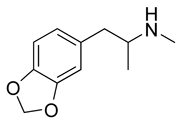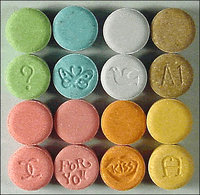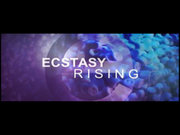MDMA
MDMA (3,4-methylenedioxymethamphetamine), most commonly known today by the street name ecstasy, is a synthetic entactogen of the phenethylamine family whose primary effect is to stimulate the secretion of and inhibit the re-uptake of large amounts of serotonin as well as dopamine and noradrenaline in the brain, causing a general sense of openness, empathy, energy, euphoria, and well-being. more...
Tactile sensations are enhanced for some users, making general physical contact with others more pleasurable; but, contrary to popular mythology it generally does not have aphrodisiac effects. Its ability to facilitate self-examination with reduced fear has proven useful in some therapeutic settings, leading to its 2001 approval by the United States FDA for testing in patients with post-traumatic stress disorder.
Acute dehydration is a risk among users who are highly physically active and forget to drink water, as the drug may mask one's normal sense of exhaustion and thirst. Also the opposite, "water intoxication" resulting in acute hyponatremia has been reported. By far the biggest danger comes from the fact that other, more dangerous chemicals (such as PMA, or methamphetamine) are either added to ecstasy tablets, or more often simply sold as ecstasy. Long-term effects in humans are largely unknown and the subject of much controversy —particularly with regard to the risks of severe long-term depression as a result of a reduction in the natural production of serotonin.
MDMA is also known by many other street names, including Adam, Beans, Biscuits, Candy, E, Eccies, Googs, Jack and Jills, MaDMAn, Mollies, Pills, Rolls, Scoobies, Smarties, Tabs, Thizz, Vitamin E, Vitamin X, X, XTC, Yaotou (in East Asia), and Yokes.
History
A patent for MDMA was originally filed on Christmas eve 1912 by the German pharmaceutical company Merck, and granted two years later (to the day). At the time, MDMA was not known to be a drug in its own right; rather, it was patented as an intermediate chemical used in the synthesis of a styptic (a drug intended to control bleeding from wounds.) Over half a century would pass before the first known ingestion of MDMA by humans.
Contrary to many rumours, the drug was never used as an appetite suppressant or as a stimulant for armed forces during wartime. (This was in fact methamphetamine.) The U.S. Army did, however, do lethal dose studies of it and several other compounds in the mid-1950's. It was given the name EA-1475, with the EA standing for Edgewood Arsenal. The results of these studies were not declassified until 1969. MDMA was first brought to public attention through Dr. Alexander Shulgin in the 1960s who recommended it for use in certain therapy sessions, naming the drug 'window' (he discovered it while searching for compounds that might have a similar psychoactive effect as other compounds contained in nutmeg). It was widely used therapeutically by US psychotherapists because of its empathogenic effects until its criminalization in the late 1980s. The drug was hailed as a miracle by therapists and counselors who claimed couples could have six months worth of progress in one use of the drug, and soldiers returning from the Vietnam war could overcome their PTSD sometimes more effectively than talk or group therapy. A small number of therapists continue to use it in their practices today. (See below for 2001 FDA approval and DEA licensing for use in patients with post-traumatic stress disorder.)
Read more at Wikipedia.org




